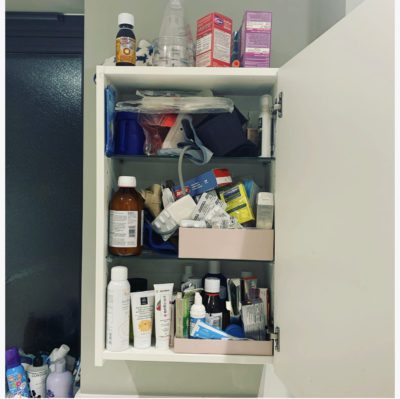Home » Mental Health » Dealing with coronavirus anxiety
(My Reframing Anxiety Course goes into significant depth on health anxiety, but I’ve been asked numerous times a day to write about how to handle Coronavirus anxiety, so I am putting some of my tips into context).

There is an air of anxiety and fear around coronavirus due to the shared stress and uncertainty it brings. It is dominating conversations, lining news shelves and flooding social media feeds. Supermarkets are being swept and diaries cleared.
Anxiety likes a focus, to ruminate on specific things. Anxiety mainly focusses on circumstances out of our direct control that have potential, unpleasant consequences. If you have experienced anxiety around health previously, Coronavirus is understandably going to be a trigger for you. In addition, your anxiety may well be raised due to being or knowing someone who is vulnerable or considered to be within an ’at risk’ group.
Anxiety is exhausting isn’t it? When we fixate on the things that trigger it, we find ourselves less able to rationalise our thoughts and ground ourselves. Anxiety occupies headspace, and casts grey shadow over the more enjoyable emotions that make you happy! If your anxiety about coronavirus is impacting your ability to enjoy the things you usually do, or you’re finding yourself pre-occupied with concern, this article is for you.
I could research and reel off a ton of statistics about the likelihood of you or someone you know being impacted by the coronavirus, but the reality is, you’ve probably seen many of those stats. And just as the theories do, the stats are often conflicting. Leaving you wondering who or what to trust, and where to turn.
What you want is reassurance. Someone to take you by the shoulders and promise you that all will be just a-okay. However, just as with anything in life, nobody has the ability to make truthful statements based on an unknown future.
Nobody can reduce their risk of illness to zero, just as no amount of money in the world could secure a future without any illness. Therefore, the most helpful thing for me to do, is to help you find ways to deal with the uncertainty we live in.
However, there is hope! Anxiety doesn’t have to rob you of your enjoyment of your health, or the times you share with your family. It doesn’t have to have you awake at night pondering the possibilities, and ruminating repeatedly over contingency plans.
Firstly, have compassion for yourself. When we feel fearful, we need compassion and guidance. Ridicule or criticism coming from others or yourself isn’t helpful. Whether those around you understand how you feel or not, try and cultivate some compassion towards yourself because it’s not your fault that you feel heightened anxiety right now.
It might be that you or someone close to you are immunosuppressed, at higher risk. Maybe you know and love someone who’s health is already challenged, and you feel terrified that this might impact them. You may have a history of trauma or anxiety, or a fear of losing someone close to you that has rushed to the forefront.
Whatever your experience, whatever is causing your anxiety, shaming and berating ourselves keeps us stuck. Not everyone will relate to your experience (although many will), but it doesn’t mean that your anxiety is less valid or your feelings less valuable and worth addressing. If you find yourself feeling frustrated, consider how you would reassure a friend, and try to use that supportive and understanding voice towards yourself.
At the moment, it’s hard to wade the reams of coronavirus articles to learn of other newsworthy topics! You may find yourself glued to the TV or flicking between news apps, on the hunt for something that will reassure you.
However, when we feel anxious, we are less able to rationalise what we read, and more likely to overemphasise the negative. Nobody has specific, certain answers about the prognosis of the coronavirus, so many articles are full of conflicting speculation. You might find it helpful to abstain from watching or reading the news, and asking someone trusted to relay any pertinent messages to you verbally instead.
Constantly checking for updates and theories fuels anxiety. As you find yourself opening a search window, pause, and ask yourself what you’re going to gain. Knowledge isn’t power when we are overwhelming ourselves with it. Searching for too much information, or searching in the wrong places can be disempowering, confusing, conflicting and frightening. Cut out the noise by choosing to stick to the facts:
https://www.who.int/news-room/q-a-detail/q-a-coronaviruses
Out of care for our own health, and respect of the health of those around us, it’s wise to educate ourselves on recommended protocol. We cannot sterilise our environment, but we can take simple preventative actions that are statistically known to reduce risk of experiencing any infectious illness. These are good techniques to instil regardless of what bugs are circulating at any time of the year.
Current advice: https://www.bbc.co.uk/news/health-51711227
If you are someone who is at additional risk to infectious illness, please do follow the official guidelines set for you.
These are the actions we have been advised to take by those acutely experienced and knowledgeable on how infectious illnesses spread. They will be looking to neither under-advise us, or over-advise us. Their overwhelming focus and aim is to halt the spread of infectious illnesses.
It’s always wise to have a contingency plan in place. Whether you have a plan for remote working, or what you’d do if you needed last-minute childcare. It’s helpful to consider these things regardless of what illnesses are around. Life is certainly known to throw the odd curveball every now and again, so having considered things like this will help reduce stress should you ever need to put things into action.
The important thing is that once you’ve considered your plan, tuck it away in the back of your mind, or on a piece of paper in a drawer. Look at your plan like the war bunker. It’s there, it’s available for when it’s called for. Let it be a reassurance that it’s there should you need it. Revisiting it, adding to it, playing it out in your mind like a film, extending it with ‘what ifs’ and overthinking will add to your anxiety.
It’s always good to keep medication up to date and your medicine cabinet well-stocked, just as it’s good to keep fuel in the car and change in your purse. Follow what is in line with current World Health Organisation and NHS advice, and question when you might be pushing that boundary out of fear and anxiety so that you can apply some supportive techniques.
When discussing coronavirus with friends or family, some people’s opinion and approach will fuel your anxiety and some will calm it. Limit how much you talk about it and when you do, choose to speak to those who are supportive and ground you. If you feel your anxiety levels increasing when discussing the virus, make an excuse to end or step away from the conversation. Discussing it with those who are also experiencing anxiety will likely reinforce your fears and increase your own feelings of anxiety.
Eating well, giving yourself the best chance to get good sleep and adequate rest, and exercising in whatever way you most enjoy is brilliant for both your mental health and your immune system.
Consider any habits that could benefit from a bit of a tweak because perhaps they add to feelings of anxiety (e.g drinking too much caffeine or alcohol) and get support in addressing them if needs be. Again, this is a good thing to do for your future, let alone the current climate.
Feelings of anxiety are triggered when we focus on negative, future unknowns and uncertainties. The difficult thing, is that we aren’t creating stories about alien invasions, they tend to be fears based in potential realities, that have not, or may not happen.
The more we think about a fearful scenario, the more our body and nervous system will respond with physical symptoms of anxiety (such as increased heart rate, stress hormones, panic attacks). We can interrupt this process by stopping the whirlwind of our thoughts in their tracks.
There are many techniques that can help halt overthinking by shifting our focus from the unknowns of the future, to the realities of the present moment. Some of my favourite techniques are:
Use these techniques as soon as you feel your mind begin to overthink or catastrophise. Practice them as you fall asleep. Use them when you don’t need them so that when you do, they feel familiar and instinctive.
Note the decisions you might be making for yourself or your family. If you notice that you are taking steps outside of the advice recommended, then consider whether the motivation is based on facts or fear.
Maintaining your normal day-to-day life where appropriate promotes a sense of normality for yourself and those around you so stay connected with others. You might find it helpful to increase contact in an appropriate manner with those who have historically had a positive impact on you and your mental health.
Challenge yourself to write a list of ten to thirty things you are grateful for. You might start off with the fundamentals such as family and your home, but the more you jot down, the more you are called to reflect on the things we take for granted, such as movement, sight, warmth, sunshine.
Return to your list when you feel like your mind is leaping ahead into the unknown. Gratitude draws our attention away from what could go wrong, to what is currently right.
Gratitude brings perspective. It ushers us to look at the things in our life that give us joy, and when we think about these things, it makes us feel good! It helps anchor ourselves in the present moment, distracting our busy minds from getting carried away in the torrent of ‘what ifs’.
You might find it enjoyable to re-engage in an old hobby, distract your mind in the pages of a novel. Either way, explore ways to put your energy into what’s most important and what makes life worth living for you. Anxiety takes up so much of our energy, so it’s helpful to find other ways to use and distract this energy if we can, in things that feed and energise, rather than take from us.
Be mindful of your assumptions. Assumptions that aren’t based on fact or rationality feed our anxiety. It might be that you find yourself feeling that everyone who has a cough or fever has coronavirus. Of course, exercise caution as advised. However, if your assumptions are negatively or unnecessarily impacting your decisions and feelings, then deal with them as anxiety fuelled thoughts.
Personally, I find it really helpful to have a phrase, sentence or ‘mantra’ that I can recall at times of anxiety or stress. I find it quite anchoring and comforting.
My current favourite mantra is: ‘Everything is okay now. And ‘now’ is the only thing that is real’.
Here are some other ideas:
I let go of fear
I return to now
I am here
Feelings aren’t facts
If you are experiencing overwhelming levels of anxiety, or notice a strong link with trauma, please seek additional support. If isn’t the first time you have experienced it, it is worth addressing. Here are some websites or resources you may find helpful:
My Reframing Anxiety Course
Read details and reviews here.
This is a 3-week guided course you do at home, taking no more than 5-10 minutes per day. It addresses all types and levels of anxiety, including health anxiety. Use the discount code ra-save15 if finances are a hurdle for you.
Mind
A charity offering information and support for mental health. Read more about anxiety and how you can help those struggling here.
NHS website
Find information on anxiety and facts on coronavirus here.
GP
How can your doctor help you with anxiety? Find out more here.
Sane.org.uk
A charity offering support for mental health, including a helpline and peer support. Find more here.

Let’s keep in touch
My monthly newsletter full of thoughts, tips and recommendations to inspire and encourage you through parenthood and sometimes an discount for one of my courses.

Anna is a mum of three, and a Psychotherapist, Author and Speaker. She is a warm communicator with a passion for taking therapy out of the therapy room.
Her hope is that through words, spoken or written, people will experience light-bulb moments, learn about themselves and be able to find more freedom and enjoyment in life.

Let’s keep in touch
My monthly newsletter full of thoughts, tips and recommendations to inspire and encourage you through parenthood and sometimes an discount for one of my courses.
8 Responses
Brilliant article. Thank you for putting this together. I will be sharing it with my mailing list and friends and family. I also use EFT tapping to help calm the anxiety response and find it works very well too .
I am so glad you found it helpful. Thank you for sharing what helps for you too.
Hi this is lovely.
I wanted to also suggest Calm which is offering some additional free resources during this time
http://calm.com/blog/take-a-deep-breath
In the words of a song It’s Amazing how you spoke right to my heart – and my mind too I might add.
It’s like it was written for me, my fears are having a huge impact on my bodies health and on my mental health and I feel it all consuming.
My family and friends try to help me rationalise my thoughts but when I see, hear or think about the people I love, family and friends alike I can hardly speak without floods of tears.
I will be referring back and forth to this page to calm myself down and to allow myself some rational thinking.
Thank you so much for this article.
Lian
Dear Lian, I am so pleased that it has been helpful for you in this confusing time. I hope it continues to offer support.
A
This was perfect for me. My anxiety and panic is through the roof. My anxiety is heightened I think due to trauma in my past. Thank you
am so glad it was helpful. Thank you for sharing this with me. I hope that the tips continue to offer support and that in time, you are able to have someone help you further process the trauma you have been through. A
Nice article, nice info for who are suffering from anxiety